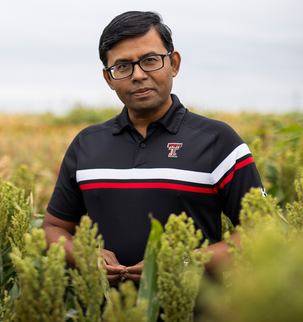Transforming grain sorghum’s yield potential through trait-based ideotype breeding
Abstract
Sorghum has an inherent ability to adapt to harsh environmental conditions. Further improvements are needed to keep sorghum production feasible under future changing climate. The proposed project addresses this need through extensive field-based phenotyping and development of trait-based ideotype sorghum hybrids specifically targeted for water-deficit and favorable environments. The knowledge, phenotyping tools and germplasm resulting from this project will help enhance water-deficit tolerance and productivity under harsh conditions and help regain acres under relatively favorable environments in the U.S. sorghum belt. To achieve this goal, a multi-disciplinary team is assembled to (i) Increase radiation use efficiency through erect leaf architecture and increased plant height; (ii) Modulate stomatal density to increase water use efficiency under water-deficit conditions and enhance carbon gain under favorable environments; (iii) Optimize stay green trait for improved source-sink relationships to enhance yield and grain protein; and (iv) Explore opportunities to increase seed number and sink strength by altering sink size. Additionally, to ensure newly developed hybrids are less vulnerable different aspects related to increased stem strength is included as a part of this holistic approach. All these objectives are planned to be integrated through crop-climate modeling to fully assess the trade-offs and interactions between target traits and environments. As such, crop-climate modeling will be used to determine effective trait combinations for specific environments, i.e., for water-limited (low stomatal density, stay green, tillering, higher primary rachis branches in panicle) and favorable (erect leaves with increased height, higher plant density, higher stomatal density, improved assimilate translocating hybrids, larger sink size and strength) environments. Findings generated by the team to achieve this goal and approaches taken to integrate these traits into breeding pipelines aimed at specific target population of environments will be discussed.
 Professor Jagadish Krishna
Professor Jagadish Krishna
Dr. Krishna Jagadish received his M.S. from the University of Agricultural Sciences, Dharward, India, and his Ph.D. in Agriculture (Crop Physiology) in 2007 from University of Reading, UK. Before joining Texas Tech University, he served as Scientist I, II and Deputy Division Head of the Crop and Environmental Sciences Division at the International Rice Research Institute, Philippines for 7 years and moved to Kansas State University as a tenured Associate Professor in 2015 and promoted to Professor in 2021.
Honors for Dr. Jagadish include the Kansas State Gamma Sigma Delta Outstanding Research Award (2021), International Fellow of the Indian Society of Plant Physiology (2021), and the Association for Agricultural Scientists of Indian Origin Outstanding Young Agricultural Scientist Award (2015). He is a member of the Crop Science Society of America, American Society of Agronomy, and the North American Plant Phenotyping Network. He was provided the prestigious Felix Scholarship (2003-2007) for his doctoral studies.
Professor Jagadish Krishna, Texas Tech University E: kjagadish.sv@ttu.edu
For any questions, please contact the QAAFI Science Seminar Committee.
For any questions, please contact the QAAFI Science Seminar Committee.
About Science Seminars
Queensland Alliance for Agriculture and Food Innovation hosts science seminars across the disciplines of animal, horticulture, crop, food and nutritional sciences.
With a range of speakers from Australia and abroad, the series explores how high-impact science will significantly improve the competitiveness and sustainability of the tropical and sub-tropical food, fibre and agribusiness sectors.
View Science Seminar pageSign up to receive QAAFI Science Seminar notifications
Email Science Seminar Committee
The Queensland Alliance for Agriculture and Food Innovation is a research institute at The University of Queensland, established with and supported by the Queensland Department of Primary Industries.
Venue
also online via Zoom: https://uqz.zoom.us/j/82825755088

